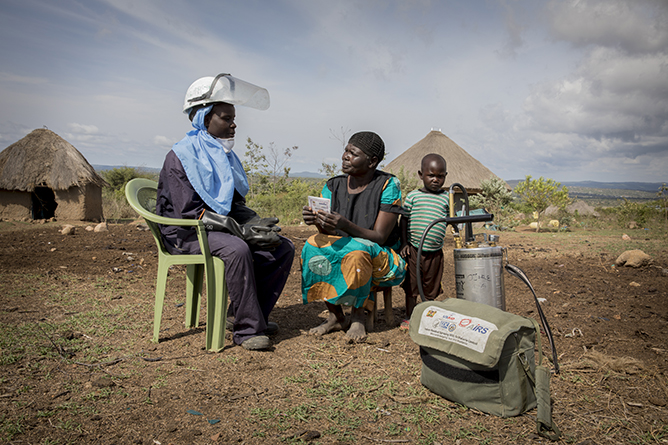 Malaria deaths worldwide continue to remain above pre-pandemic levels, claiming 608,000 lives in 2022, according to the 2023 World Malaria Report issued by the World Health Organization (WHO). Prior to the pandemic’s onset, there had been major reductions in morbidity and mortality from malaria over the previous decade, gains primarily due to investments in vector control interventions by the U.S. President’s Malaria Initiative (PMI), the Global Fund, and country governments. Among these vector control interventions are the deployment of insecticide-treated mosquito nets (ITNs) and indoor residual spraying (IRS), which kills the mosquitoes that transmit malaria by spraying insecticide on the walls, ceilings, and other indoor resting places of those mosquitoes.
Malaria deaths worldwide continue to remain above pre-pandemic levels, claiming 608,000 lives in 2022, according to the 2023 World Malaria Report issued by the World Health Organization (WHO). Prior to the pandemic’s onset, there had been major reductions in morbidity and mortality from malaria over the previous decade, gains primarily due to investments in vector control interventions by the U.S. President’s Malaria Initiative (PMI), the Global Fund, and country governments. Among these vector control interventions are the deployment of insecticide-treated mosquito nets (ITNs) and indoor residual spraying (IRS), which kills the mosquitoes that transmit malaria by spraying insecticide on the walls, ceilings, and other indoor resting places of those mosquitoes.
Thanks to the generosity of the American people and steady support from the U.S. Congress, PMI has helped lead global efforts that have saved 11.7 million lives and prevented more than 2 billion malaria infections since 2000. In January 2023, the United States continued its investments in tackling this deadly disease, through the awarding of a new, five-year contract, the Evolving Vector Control to Fight Malaria Project, known as PMI Evolve
PMI Evolve is supporting PMI, as well as U.S. Agency for International Development (USAID) missions and bureaus with the planning, implementing, and monitoring of malaria vector control programs, including entomological monitoring, IRS, ITNs, and larval source management (LSM). PMI Evolve is strengthening the capacity of local institutions, including countries’ national malaria programs, district health offices, and research institutions to independently conduct vector control programs. The project is also responsible for program evaluation and conducting operations research on new vector control innovations. PMI Evolve is incorporating gender equity and social inclusion (GESI) and climate change initiatives as cross-cutting themes with the overall goal of ending malaria faster.
The project is working in 21 PMI partner countries: Burkina Faso, Burundi, Cambodia, Cameroon, Cote d’Ivoire, Democratic Republic of Congo, Ethiopia, Ghana, Guinea, Liberia, Madagascar, Malawi, Mozambique, Niger, Nigeria, Rwanda, Senegal, Sierra Leone, Uganda, Zambia, and Zimbabwe.
PMI Evolve is led by Abt Associates in partnership with Population Services International, PATH, Tropical Health, and EnCompass LLC, along with the support of BAO Systems LLC, Cross Cut, Dimagi, Inc., Health Information Systems Program (HISP) Centre at the University of Oslo (UiO) and its affiliates in West and Central Africa and Uganda, Malaria Consortium, and the University of California, San Francisco (UCSF) Malaria Elimination Initiative.

